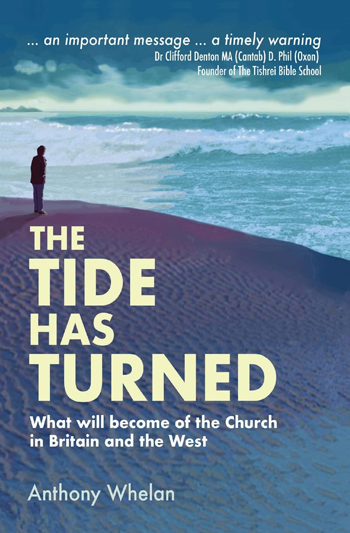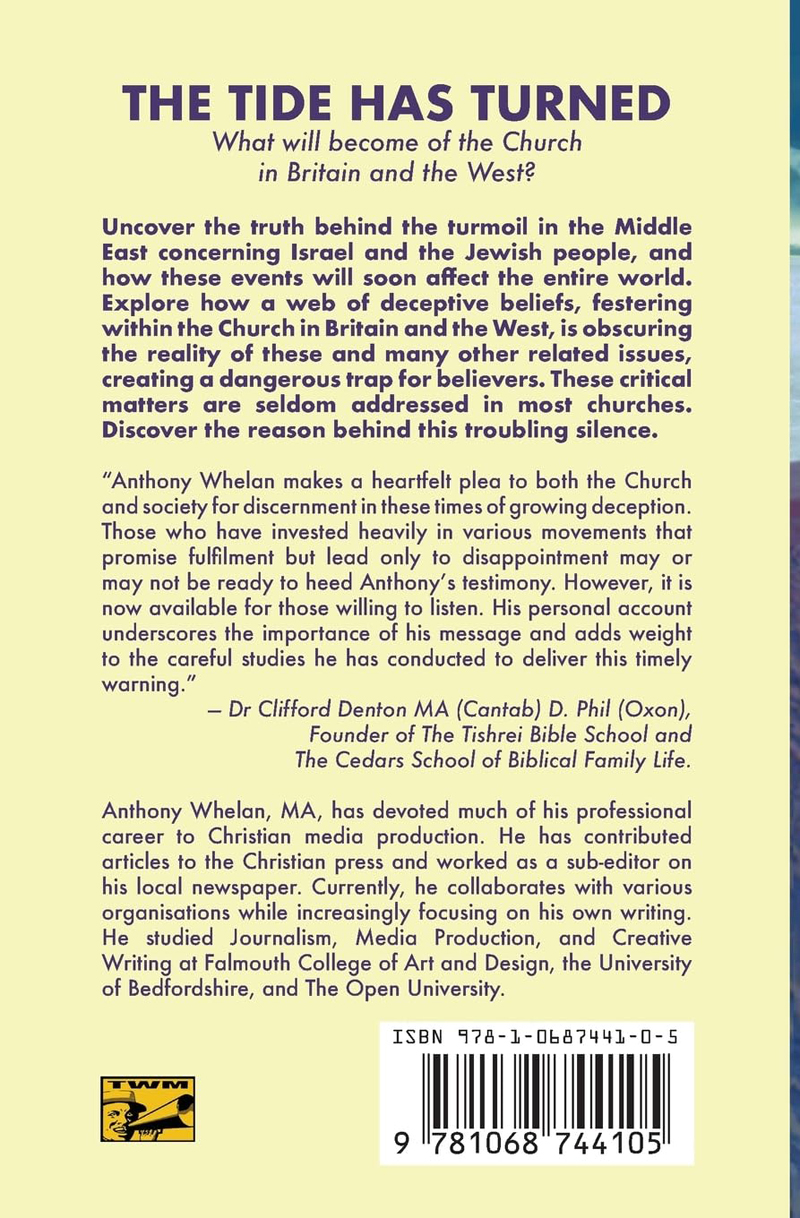Book Review by Charles Gardner — 
Anthony Whelan recalls the time when he and his schoolfriends were caught on a sandbank as the rising tide threatened to sweep them away. Fortunately, they were rescued in the nick of time by a passing boat.
The real-life scene became a picture of how he sees the Church drifting away from its moorings as it holds on to false teachings built upon sinking sand, as told in The Tide has Turned (Tony Whelan Media, 2024).
Tony grew up in Southend-on-Sea in Essex, England, where a troubled home life gave way to criminal behavior (including burglary) and a ‘hippie’ culture of sex and drugs where virtually anything became acceptable. But his rebellion against authority landed him in prison.
It was only after his brother became a Christian while he too was behind bars that Tony eventually had a wake-up call. In seeking to know whether God was there for him, he became powerfully aware of a divine presence and even had a vision of Jesus dying in agony on the cross for the sins of the world including his own.
Life took on a new meaning. He had finally found purpose and direction as he got involved in gospel outreach, mainly through what came to be known as ‘new churches’ promising to bring the power and transformation of God’s kingdom to society’s secular institutions.
But then, in 2017, he had an epiphany. He joined an organized tour of Israel and was shocked by the contradiction between what he witnessed there and the Western media’s perception of the conflict there, absorbed and reflected lock, stock and barrel by much of the church.
He discovered that the Jewish people were not occupying Arab land, as was generally supposed. It was theirs by right of international law as well as a string of biblical promises.
In particular, he felt forced to ask why questions surrounding little Israel, among the hottest news topics of the day, are constantly ignored in the pulpits of our land?
Why did we not hear more about how a major fulfillment of end-time prophecy has taken place before our eyes in recent generations – i.e. the return of the Jews to the Holy Land, just as the prophets foretold it would happen. And how that surely should focus our attention on what God is doing there in that tiny strip of land being fought over so fiercely by those wishing to exterminate the very people who brought us the gospel?
These questions simply went unanswered, causing Tony to research and explore the theological basis of the many churches he had come to know and experience. The most striking missing ingredient was an almost total blackout on a subject mentioned throughout the Bible.
In general, it was simply never discussed, with many subscribing to the theory that the Church has replaced Israel in God’s end-time purposes (so-called Replacement Theology). Christians seemed to focus on almost every issue except Israel despite its miraculous re-birth and subsequent rapid rise to global prominence.
As a result, the Old Testament is often downgraded while prophetic passages from the likes of Ezekiel and Jeremiah tend to be ‘Christianized’ or ‘spiritualized’ to apply to Gentile believers rather than be seen in their original context – a message to Israel that is still relevant today.
For example, the resurrection from the Valley of Dry Bones in Ezekiel 37 is plainly fulfilled by the rise of the modern state of Israel within just three years of the Holocaust and is not primarily about Christian revival.
Tony goes on to explore what he sees as the faults of several new church streams spawned by the charismatic renewal. Though he is convinced the latter was a genuine move of God, he questions the theological basis for much that has since emanated from that initial outpouring of the Spirit, including Restorationism, the Kingdom Now movement and the so-called New Apostolic Reformation.
I’m not convinced that his sweeping diagnosis is always correct. For example, he is quick to condemn much false prophecy, and I believe he is right in many cases. But whoever predicted that Donald Trump would serve a second term as U.S. President, which he lumps together with the false prophets, hardly got that wrong.
I believe much that was fresh and vibrant came out of these movements, from which he now distances himself. For example, Restorationism brought a new sense of awe and beauty to corporate worship. But in assuming that God was finished with Israel, it also led us down a blind alley that would ultimately bring death – because they no longer share “in the nourishing sap from the olive root” (Romans 11:17) as St Paul put it, adding: “You (Gentiles) do not support the root, but the root supports you.” (v18)
Having said that, this book is very thoughtful, stirring, challenging and well-written. Endorsed by Hebraic scholar Dr Clifford Denton as “an important message” and “a timely warning”, it’s a hard pill to swallow, but I recommend you take the medicine both for your own long-term health as well as that of the church as a whole.
To find out more about Whelan’s book, go here




